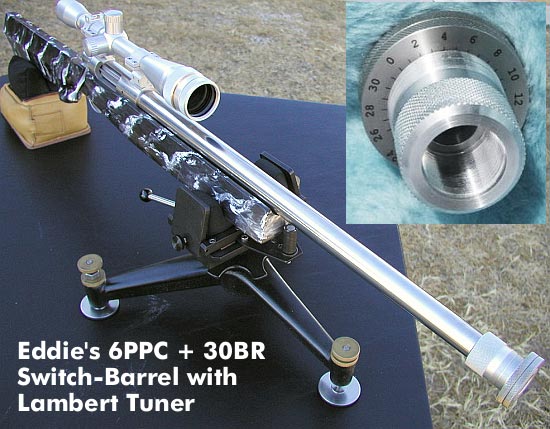Tuning Barrels for Enhanced Precision and Accuracy

When a shot is fired through it, a barrel will exhibit harmonics. Tuning these harmonics (the “waves” that propagate through the barrel) can alter point of impact and, if you’re lucky, reduce group size. Barrel tuners have been used successfully in rimfire benchrest for many years (see photo above). While there are competing theories as to how and why barrel tuners work on rimfire rifles, there is no question that the accuracy of some rimfire barrels can be improved with the addition of a tuner. By changing the position of weights at the end of the barrel, we’ve seen shooters shrink their average group size as well as adjust the “sweet spot” for different lots of rimfire ammo. On the other hand, tuners can be the source of great frustration; some installations may yield little or no benefit. A shooter may have to experiment with a variety of different tuner designs (and weights) to find the optimal configuration.
 Centerfire Tuners–Still a Work in Progress
Centerfire Tuners–Still a Work in Progress
In centerfire benchrest competition, the vast majority of competitors do not use tuners, though a few short-range shooters such as Gene Bukys and Jackie Schmidt have enjoyed considerable success. Gene has won major championships with tuned rifles. In 2011 Gene won both the Super Shoot and World Benchrest Championship (WBC), and Gene recently set a new NBRSA Sporter Class Grand Agg Record.
Centerfire benchrest guns typically employ shorter barrels with a much fatter contour (larger diameter) than rimfire rifles. Because centerfire rounds produce much higher pressures and velocities that a 22LR, a centerfire barrel also exhibits much different vibration characteristics than a typical rimfire barrel. Nonetheless, there are pioneers working with centerfire tuners who believe that tuning may be the “next leap forward” in centerfire accuracy.

Shown below is a switch-barrel benchrest rifle built by Forum member Eddie W. of Texas. It features a dual-port Hall “M” action with a ShadeTree Engineering Tuner crafted by Butch Lambert. The gun is designed to take both a 6PPC barrel for group shooting and a 30BR barrel for score shooting. The gun was barreled by Wayne Shaw, and Eddie did the stock work himself. Eddie reports: “It is a very accurate rifle.”

Will we see more tuners on centerfire rifles? Only time will tell. Some folks believe that, since one can easily adjust the loads shot by centerfire guns (by tinkering with the powder charge and seating depth), tuners have limited utility. On the other hand, tuner advocates such as Gene Beggs believe tuners can help keep your group sizes small even as conditions (temperature, humidity) change. Gene believes that, with an appropriate tuner, you can spend less time fiddling with the load specs (changing your powder charge) and instead “dial in” your sweet spot using the tuner.

Similar Posts:
- Centerfire Benchrest Shooters Explore Benefits of Tuners
- Gene Bukys Sets New Sporter 100/200 NBRSA Grand Agg Record
- SHOT Show Report: Adjustable barrel weights from AirForce
- New Centerfire Tuner from ShadeTree Engineering
- Tech Tip: Pros and Cons of a Barrel Tuner
Tags: Barrel, Bukys, Centerfire, IBS, Rimfire, tuner, Tuning


















My tuners are available at bullets.com exclusively.
I guess it’s somewhat a geographical thing…Most centerfire shooters in this area are using tuners already and doing very well with them. Interesting article…
Tuners really are game changers. Yes, you can keep a cf in tune with powder charge but a tuner makes it soooo much easier. The top shooters figured out how to do it with powder charge…Tuners make it so everyone can do it, much easier and more precisely. I’ve been strongly considering buying an ad on this site…Who do I contact? Thanks!